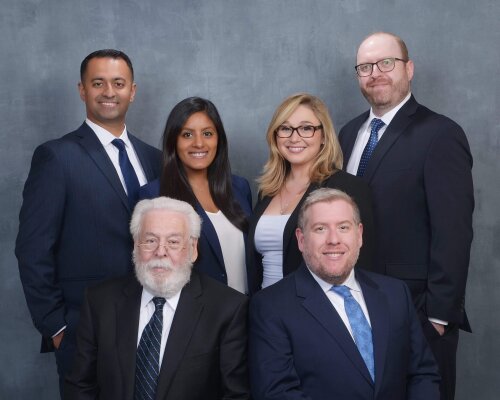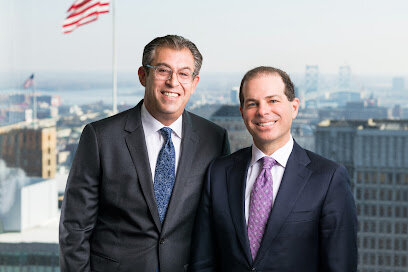Best Toxic Mold Lawyers in Philadelphia
Share your needs with us, get contacted by law firms.
Free. Takes 2 min.
List of the best lawyers in Philadelphia, United States
About Toxic Mold Law in Philadelphia, United States
Toxic mold refers to certain types of fungi that can grow indoors when moisture is present. Exposure may aggravate asthma, cause respiratory problems, allergic reactions, and in some cases may be linked to more serious health effects - especially for people with weakened immune systems, infants, and the elderly. In Philadelphia, as in the rest of the United States, there is no single federal law that sets enforceable indoor mold limits. Instead, mold issues are handled through a combination of local housing and health codes, state tort and landlord-tenant law, insurance policy language, and public-health guidance.
Practically, this means that addressing toxic mold problems often involves multiple systems - municipal code enforcement, medical documentation, environmental testing, insurance claims, and sometimes litigation. Knowing how these systems interact can help you protect your health, recover damages, and get prompt repairs.
Why You May Need a Lawyer
Most mold problems are resolved without litigation, but there are common situations where legal help is important:
- Serious health harm - If you, a family member, or a tenant developed significant or chronic health problems you believe are related to mold exposure, a lawyer can help document causation, preserve medical records, and pursue claims.
- Landlord refuses to repair - If you have repeatedly notified a landlord and they fail to remediate moisture or mold, an attorney can advise on remedies such as court-ordered repairs, rent abatement, or damages for breach of the lease or habitability standards.
- Retaliatory actions - If a landlord tries to evict, raise rent, or otherwise retaliate after you reported mold or requested repairs, a lawyer can protect your tenant rights and pursue counterclaims.
- Insurance denials or disputes - If your homeowner or renter insurer denies coverage for mold-related damage or refuses to pay loss-of-use or medical costs, an attorney can review the policy and handle disputes or bad-faith claims.
- Workplace exposure - Employees exposed to mold at work may need counsel for workers compensation or to evaluate third-party employer liability.
- Complex or multi-unit cases - In large apartment buildings or multi-home developments with widespread mold, a lawyer can coordinate class claims, property owner liability theories, and code-enforcement strategies.
- Evidence and expert work - Toxic mold claims often require expert industrial hygienists, environmental testing, and medical experts; an attorney can coordinate and fund expert work and prepare strong proof for court or settlement.
Local Laws Overview
Several local and state rules affect how toxic mold claims are handled in Philadelphia:
- Philadelphia Property Maintenance and Housing Codes - Philadelphia enforces property maintenance and housing standards through the Department of Licenses and Inspections (L&I). These codes require landlords and property owners to maintain premises in a safe and healthy condition, including preventing and remedying moisture intrusion, leaks, and conditions that foster mold growth. Complaints can lead to inspections, violation notices, and repair orders.
- Philadelphia Department of Public Health - The city public-health authorities provide guidance on mold and may investigate public-health risks. Code violations that pose a health risk can trigger public-health enforcement actions.
- Pennsylvania landlord-tenant law - State and case law create duties for landlords to provide habitable premises. While the exact remedies depend on the lease and facts, tenants often can seek repairs, rent adjustments, or damages where landlords fail to cure hazardous conditions. Before withholding rent or making self-help repairs, tenants should consult an attorney because Pennsylvania law on rent withholding varies and improper withholding can risk eviction.
- Statutes of limitations - Pennsylvania limits the time to bring claims. Common time frames include about two years for most personal-injury and property-damage claims and four years for many contract claims. Timelines can vary depending on when harm was or should reasonably have been discovered. Prompt action helps preserve legal rights.
- Insurance regulation - Insurance companies operating in Pennsylvania must follow state insurance rules. Courts often look closely at policy language to determine whether mold-related losses, remediation costs, or medical expenses are covered.
- No single federal numeric standard - Federal agencies such as the Centers for Disease Control and Prevention and the Environmental Protection Agency provide guidance on assessing and remediating indoor mold. However, enforcement and legal remedies are primarily local and state-based.
Frequently Asked Questions
What counts as toxic mold and how do I know if I have it?
Mold species are identified by laboratory testing. "Toxic mold" is a non-technical term often used to describe molds that produce mycotoxins. Visible mold growth, musty odors, persistent dampness, or health symptoms such as new or worse respiratory problems can indicate a problem. A qualified industrial hygienist or environmental professional can inspect and test to identify mold type, concentration, and likely sources.
Who is responsible for fixing mold in a rental property in Philadelphia?
Generally, the landlord is responsible for keeping rental property in a habitable condition and addressing moisture sources and mold. Tenants should notify the landlord in writing of the problem and allow reasonable access for repairs. If the landlord fails to act, tenants can seek municipal enforcement through L&I, consult tenant legal services, or pursue legal remedies. Avoid withholding rent without legal advice.
Can I sue my landlord for mold-related illness or property damage?
Yes, you may have grounds to sue for personal injury, property damage, breach of the lease, breach of the warranty of habitability, or code violations. Success depends on proof that the landlord knew or should have known about the condition, failed to act, and that that failure caused your injury or damage. Medical records, environmental testing, repair records, and notice to the landlord all strengthen your claim.
Should I get mold testing, and who pays for it?
Testing is helpful when landlord, insurer, or other parties dispute conditions or the extent of contamination. An industrial hygienist or certified mold assessor is the preferred expert. Who pays depends on circumstances - tenants sometimes pay for initial testing and seek reimbursement; other times landlords or insurers pay. Consult an attorney about preserving costs for potential recovery.
What if my insurer denies coverage for mold cleanup or health claims?
Insurance policies vary widely. Many policies limit or exclude coverage for mold, while others cover it within certain limits. If your insurer denies a claim you believe should be covered, get the denial in writing, preserve policy documents and communications, and consult an attorney experienced in insurance disputes. Time limits for filing lawsuits against insurers apply.
Can reporting mold lead to eviction or retaliation by a landlord?
Retaliation by a landlord - including eviction, unexplained rent increases, or harassment - may be illegal in Philadelphia and could constitute grounds for a tenant to sue or use as a defense in eviction proceedings. Keep records of communications, repair requests, and any retaliatory acts, and seek legal help promptly.
How do I document mold and related damages to build a legal case?
Document thoroughly: date-stamped photos and videos of affected areas, copies of repair requests and landlord responses, medical records and doctor notes linking symptoms to exposure, receipts for remediation or replacement of damaged property, inspection or testing reports, and any communications with neighbors or building management about repeated problems. These records are critical for municipal complaints, insurance claims, and lawsuits.
What remedies are available if mold forces me out of my home?
Possible remedies include temporary relocation or loss-of-use damages, reimbursement for relocation costs, rent abatement, repair and remediation paid by the landlord, and damages for personal injury or property loss. Remedies depend on the facts, lease terms, and applicable laws. Consult an attorney to identify the best legal path.
Is there a time limit to bring a mold-related claim in Pennsylvania?
Yes. For most personal-injury claims in Pennsylvania, the statute of limitations is two years from the date of injury or from when the injury should reasonably have been discovered. Property-damage claims often follow similar two-year limits, while some contract claims may have four-year limits. These time periods can vary, so act quickly to preserve rights.
How do I find a lawyer who handles toxic mold cases in Philadelphia?
Look for attorneys with experience in landlord-tenant disputes, premises liability, toxic torts, and insurance claims. Ask about case results, experience working with environmental and medical experts, fee arrangements (hourly vs contingency), initial consultation offerings, and whether they have handled cases under Philadelphia housing codes. Local bar associations, legal aid groups, and community organizations can help with referrals.
Additional Resources
These local and national resources can help you navigate mold issues and related legal steps. Contact the appropriate agency for reporting, guidance, or assistance:
- Philadelphia Department of Licenses and Inspections - for property maintenance inspections and code enforcement
- Philadelphia Department of Public Health - for public-health guidance and reporting
- 311 Philadelphia - municipal reporting system for housing and public-health complaints
- Pennsylvania Department of Environmental Protection - state environmental guidance and resources
- Centers for Disease Control and Prevention - public-health guidance on mold and health effects
- Environmental Protection Agency - guidance on mold remediation and indoor air quality
- Community Legal Services of Philadelphia - tenant legal assistance and housing-related legal help
- Philadelphia Bar Association - lawyer referral service and resources for finding qualified attorneys
- Tenant advocacy groups and local housing counseling organizations - for tenant rights information and community support
Next Steps
If you suspect toxic mold exposure or have a mold-related legal problem, follow these practical steps:
- Address immediate health needs - Seek medical care for any symptoms and ask your provider to document diagnoses, tests, and the potential link to indoor environmental exposure.
- Document the problem - Take dated photos and videos, log symptoms, and keep records of communications with landlords, property managers, insurers, and contractors.
- Notify the landlord or property owner in writing - Describe the issue, request prompt remediation, and keep a copy of the notice.
- Report to local authorities if needed - File a complaint with Philadelphia 311 or L&I if the landlord does not act or the condition poses a public-health risk.
- Preserve evidence - Do not discard contaminated items until you have documentation or have been advised by counsel. Keep receipts for repairs, medical bills, and temporary housing costs.
- Consider professional testing - If necessary, hire a qualified industrial hygienist or environmental consultant to assess the extent of contamination and its source. Discuss the role of testing with a lawyer before spending large sums.
- Notify your insurer - Report property damage to your homeowner or renter policy and keep copies of all communications.
- Consult an attorney - If the landlord refuses to remediate, there is significant health harm, insurance disputes arise, or you face eviction or retaliation, contact a lawyer experienced in mold, landlord-tenant, or toxic-tort matters. Ask about timelines, likely costs, and how they handle expert work.
- Act quickly - Statutes of limitations and procedural deadlines can limit recovery. Early legal advice helps preserve claims and evidence.
Disclaimer - This guide provides general information about toxic mold issues in Philadelphia and is not a substitute for personalized legal advice. Laws and procedures change. For advice about your specific circumstances, consult a qualified attorney.
Lawzana helps you find the best lawyers and law firms in Philadelphia through a curated and pre-screened list of qualified legal professionals. Our platform offers rankings and detailed profiles of attorneys and law firms, allowing you to compare based on practice areas, including Toxic Mold, experience, and client feedback.
Each profile includes a description of the firm's areas of practice, client reviews, team members and partners, year of establishment, spoken languages, office locations, contact information, social media presence, and any published articles or resources. Most firms on our platform speak English and are experienced in both local and international legal matters.
Get a quote from top-rated law firms in Philadelphia, United States — quickly, securely, and without unnecessary hassle.
Disclaimer:
The information provided on this page is for general informational purposes only and does not constitute legal advice. While we strive to ensure the accuracy and relevance of the content, legal information may change over time, and interpretations of the law can vary. You should always consult with a qualified legal professional for advice specific to your situation.
We disclaim all liability for actions taken or not taken based on the content of this page. If you believe any information is incorrect or outdated, please contact us, and we will review and update it where appropriate.












